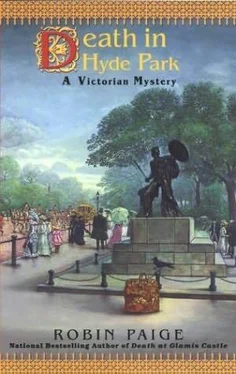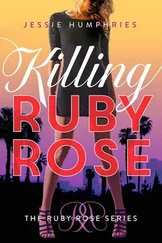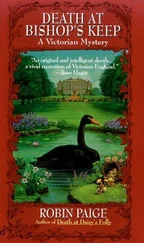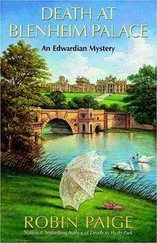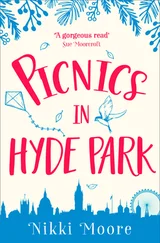Robin Paige - Death in Hyde Park
Здесь есть возможность читать онлайн «Robin Paige - Death in Hyde Park» весь текст электронной книги совершенно бесплатно (целиком полную версию без сокращений). В некоторых случаях можно слушать аудио, скачать через торрент в формате fb2 и присутствует краткое содержание. Жанр: Классический детектив, на английском языке. Описание произведения, (предисловие) а так же отзывы посетителей доступны на портале библиотеки ЛибКат.
- Название:Death in Hyde Park
- Автор:
- Жанр:
- Год:неизвестен
- ISBN:нет данных
- Рейтинг книги:5 / 5. Голосов: 1
-
Избранное:Добавить в избранное
- Отзывы:
-
Ваша оценка:
- 100
- 1
- 2
- 3
- 4
- 5
Death in Hyde Park: краткое содержание, описание и аннотация
Предлагаем к чтению аннотацию, описание, краткое содержание или предисловие (зависит от того, что написал сам автор книги «Death in Hyde Park»). Если вы не нашли необходимую информацию о книге — напишите в комментариях, мы постараемся отыскать её.
Death in Hyde Park — читать онлайн бесплатно полную книгу (весь текст) целиком
Ниже представлен текст книги, разбитый по страницам. Система сохранения места последней прочитанной страницы, позволяет с удобством читать онлайн бесплатно книгу «Death in Hyde Park», без необходимости каждый раз заново искать на чём Вы остановились. Поставьте закладку, и сможете в любой момент перейти на страницу, на которой закончили чтение.
Интервал:
Закладка:
Kate Sheridan folded her gloves and tucked them into the belt of the linen smock she wore over coarse canvas trousers to work around the grounds. “Well, what do you think, Mrs. Bryan?” She frowned down at the sickly-looking calf lying in the hay. “Should we ask the veterinary to stop round?”
“I’m afraid so, m’lady,” Alice Bryan said, sounding vexed and regretful. “If we could only get the poor creature on its feet, I feel sure we could save it. But nothing I’ve tried seems to help.”
Mrs. Bryan was the new matron of the School for the Useful Arts, which Kate had begun several years before at Bishop’s Keep, the Essex estate she had inherited from her aunts. The school now enrolled nearly two dozen women-half who came daily from the neighboring villages, half boarders-for a year-long scientific and practical course in horticulture, dairying, bee-keeping, and orchard management, organized after a plan for scientific education in rural districts developed by the Countess of Warwick, near Dunmow. Mr. Humphries, Kate’s head gardener, taught horticulture (including glass-house growing and orchards); while Mrs. Bryan handled the dairying, poultry, and bee-keeping courses; Mrs. Grieve came in regularly to teach a course in the cultivation and use of herbs; and Kate herself taught the fundamentals of financial management-a subject in which she had some practical experience.
Kate had put a great deal of effort into this ambitious project during the past several years, for she felt it would give women the skills and confidence that would enable them to earn an independent living in rural areas, where land was rapidly going out of cultivation. Since the Corn Laws had been repealed, traditional crops such as wheat and oats could no longer compete with cheap foreign imports, and many farm workers were forced to desert their fields for factory jobs in the industrial cities. But there were still women in the villages, young women desperate for work and willing to take on the most poorly-paid pursuits. These deserted acres and unproductive lives could be turned to good account-if not by growing traditional crops, then by raising flowers, fruit, and vegetables for the inexhaustible new markets in the towns and cities. But this could happen only if young women learned how, at an early age, before they were driven into service or factory work.
Kate knew, despairingly, that her small effort wasn’t nearly enough. There were thousands, no tens of thousands, of women who needed help in finding good work for themselves and their families. And there was strong opposition from neighboring gentry, who were upset at the idea that women who might have gone into their service were instead hoping to become independent farmers, and from certain local clergy, who felt that education might encourage the village women to aspire to goals beyond those appropriate to their class. But at least it was a start, she consoled herself, and several small efforts might, collectively, turn the tide of townward migration. And even if only a few of her graduates succeeded in creating smallholdings and market gardens, they would show the way to others. They would “Two guests, m’lady. Miss Lovelace, and a young gentleman.”
Kate turned around to see the butler. Hodge’s tone was dryly correct, but the muscles knotted in his jaw reflected his belief that no self-respecting butler should have to summon her ladyship from a dirty byre, where she clearly did not belong.
Kate smiled. Nellie Lovelace was her young friend from the theater, whom she had not seen in months. “Thank you, Hodge. Tell Miss Lovelace that I’ll be there in a moment.” To Mrs. Bryan, she said, “Let’s send one of the girls to the surgery on a bicycle. Perhaps the vet can stop in this evening. And do let me know when he comes-I’d very much like to hear what he thinks.”
“Very good, m’lady,” Mrs. Bryan replied. She turned, raising her voice. “Polly!” she bawled. “Polly, ye’re needed. Come ’ere.” At her strident summons, the calf, startled, clambered clumsily to its feet.
“I’ve shown Miss Lovelace to the library, m’lady,” Hodge said stiffly, his eyebrows registering his disapproval of the lady in question, whom he had known when she worked at Bishop’s Keep a few years earlier, as a kitchen maid.
“Thank you, Hodge,” Kate said. “Please be so good as to send in some tea, would you?”
“Certainly, ma’am.” The butler opened the heavy oak library door and stepped back to allow Kate to enter.
“Nellie!” Kate exclaimed, holding out both hands. “What a delight it is to see you!”
“Good afternoon, m’lady.” The young woman who rose eagerly from the plum-colored settee was tall and dark-haired, with flashing dark eyes and a coquettish expression. She wore a stylish cream-colored flannel suit with a pink velvet sash, the jacket trimmed in silk soutache braid. Her wide-brimmed hat was made of braided straw and heaped with pink silk ribbons, and her cheeks and mouth were unmistakably rouged. No wonder Hodge disapproved, Kate thought. He was not used to seeing women who painted-although to her, Nellie looked splendid, in a theatrical sort of way.
“I thought,” Kate said, putting her cheek to Nellie’s, “that we had settled that m’lady business long ago. You must call me Kate, or I shall call you Ellie Wurtz, as you were when we met, and you won’t like that.” She turned to Nellie’s companion, a thin young man, finely-featured and rather effeminate. He wore a white linen suit with a puff of beige silk handkerchief in the breast pocket and a gold watch chain draped elegantly across an embroidered cream waist-coat. “And who is this friend you’ve brought for a visit?”
Nellie’s slanted glance, Kate thought, was more than a little uncomfortable. “This is Charles Conway. My… my cousin. From Brighton.”
“Welcome to Bishop’s Keep, Mr. Conway,” Kate said with a smile, as the young man made a graceful bow over her hand. With half a smile, she added, “I wasn’t aware that Nellie had any cousins, in Brighton or elsewhere, so I am even more glad to know you.”
Kate had discovered Nellie Lovelace some four years before, when she was still thin, pale Ellie Wurtz, a seventeen-year-old orphan waif living in Miller’s Court, off one of the worst streets in the East End. ^3 She had brought the girl to Bishop’s Keep, where Ellie had worked as Mrs. Pratt’s kitchen maid for nearly a year, eating regular meals and spending her spare time reading with Kate until her gaunt frame had filled out and her confidence had begun to bloom. Then, because the girl wanted more than anything else to become an actress, Kate had introduced her to those she knew in the theater: Bram Stoker, at the Lyceum, and Frank Curzon, who managed the Royal Strand. Now Nellie Lovelace, hers was one of the brightest stars in the firmament of the newly popular musical theater, and Kate read frequently of her in the London papers.
Nellie cleared her throat uncomfortably. “Charles isn’t exactly a
… a cousin,” she said, her cheeks glowing under her rouge.
Kate smiled, thinking that perhaps Nellie was about to tell her that there was an engagement in the offing-although this slight, rather pretty young man did not strike her as the sort who would steal Nellie’s heart. She would expect her to be attracted to a man’s man, someone with more energy and self-confidence.
“Nor from Brighton,” Nellie added. She raised and lowered an apologetic shoulder and glanced at her friend. “I’m sorry, Lottie,” she said with a dramatic sigh. “I tried, but I just can’t lie to Lady Sheridan.”
“I didn’t really expect you could,” the other said in a practical tone. The voice was low and throaty, but it was not a man’s voice. “I’m very sorry, Lady Sheridan. Please forgive us for trying to deceive you. My name is Charlotte Conway-Lottie.”
Читать дальшеИнтервал:
Закладка:
Похожие книги на «Death in Hyde Park»
Представляем Вашему вниманию похожие книги на «Death in Hyde Park» списком для выбора. Мы отобрали схожую по названию и смыслу литературу в надежде предоставить читателям больше вариантов отыскать новые, интересные, ещё непрочитанные произведения.
Обсуждение, отзывы о книге «Death in Hyde Park» и просто собственные мнения читателей. Оставьте ваши комментарии, напишите, что Вы думаете о произведении, его смысле или главных героях. Укажите что конкретно понравилось, а что нет, и почему Вы так считаете.
